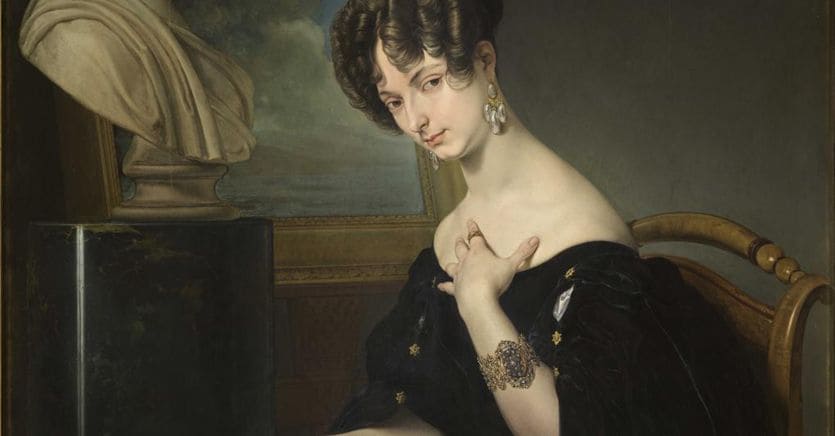Observations on the current state of Italy and its future – a very evocative title of a present, like today then, full of unknowns – it is among the last works of Cristina Trivulzio di Belgiojoso, “Grande Dame” of the Risorgimento or, to quote the famous contemporary Carlo Cattaneo, “prima donna d ‘ Italy”. This year we commemorate the 150th anniversary of his death (it took place on July 5, 1871 in Milan), and, in keeping with the anniversary, the monograph on this compelling figure of the nineteenth-century Italian history, not only Cristina Trivulzio of Belgiojoso (Milan 1808 – Milan 1871). Historiography and politics in the Risorgimento, by Karoline Rörig, in which the protagonist’s dedication to the past, present and future of the homeland emerges as the core of the investigation.
Cristina Trivulzio
Famous for her sentimental adventures – with the birth of her daughter out of wedlock -, for episodes bordering on the scandal of a free life beyond conventions and for her stubbornness in conducting oneself, we discover that we know much less about the real Cristina Trivulzio than we think, especially the cultural influence on the ideas and political action of the time. Authentic, first intellectual biography, this publication explores the Belgiojoso – extraordinary woman, whose eventful life, as exciting as the relentless commitment in and for the Italian national movement fascinate – much of what has been overlooked so far. If its intriguing charm has in fact too distracted by the work of a tireless fighter, author during the short life (she dies at 63) of a flood of books, pamphlets, articles for the Italian and international press, subject at the time also of heated debates and polemics; now in the pages of a book of substance, Karoline Rörig shows that she has systematically traced and analyzed his works and unpublished works, taking into account the context and going beyond mere re-enactment, to grasp the most authentic and multifaceted features of her thought and work.
Loading…
Paris
Cristina Trivulzio of Belgiojoso begins her studies and action on Italy facilitated by the prestigious circle of friends of exile in Paris, in which historians, politicians, influential intellectuals from Augustin Thierry to François Mignet and François Guizot, Victor Cousin or Victor Considérant stand out . But then, gradually, he knows how to direct them by himself, in constant dialogue with his contemporaries and the political conditions of Europe, on concrete ideals and programs, aimed at forming the unified Italian national state. And if so far the thought and program have not been fully understood, here Karoline Rörig gives the greatest contribution, investigating the stages step by step and identifying her “three-phase model”, based on political education and reforms, intended to involve all components of society in a moderate itinerary, but by no means excluding, last ratio, a solid revolutionary commitment.
“Belgiojoso Division”
It is in fact not by chance that Belgiojoso acted in 1848, leading the corps of volunteers called “Divisione Belgiojoso” from Naples to Milan, where he founded the newspaper “Il Crociato” – a name, a program -, later fighting in the Roman Republic of 1849 next to Mazzini and Garibaldi. Paladin of the “three-phase” initiative, author, publicist, founder and editor of magazines and papers, reformer, revolutionary, Belgiojoso from the pages of Rörig a concrete woman emerges: not an abstract theorist but a pragmatic subject, with a vocation to launch valid warnings for contemporaries as well as for Italy today.
Not for nothing do you mention them Observations on the current state of Italy, dated 1868, like his other writings, find accents of astonishing topicality, especially in the analysis of society and the character of fellow countrymen, in which he marks the “bell tower patriotism, or municipalism”, an atavistic evil destructive of the basic civic sense for cohesion of the nation. It is evident that with such assertions one does not make only friends, and of critics he has to face, but for periods he manages to mobilize a following around his newspapers and the Society of the Unification of Italy, which she founded in 1848: noteworthy , this «moderate and peaceful liberal party», or «progressive party», since in the Risorgimento it was among the first such formations, and, according to Karoline Rörig, first initiated and led by a woman.
